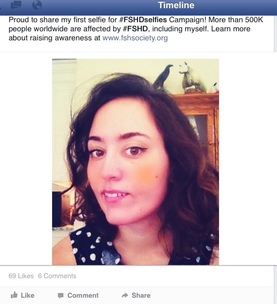We often associate a selfie with Kim Kardashian and making duck-faces, but for some, a photograph has a deeper meaning.
On July 7th, the FSH Society launched their national Selfies Campaign in order to promote awareness for Facioscapulohumeral Muscular Dystrophy. For every selfie posted on social media tagged with the #FSHDselfies, one dollar would be donated for research in hopes of a future cure or treatment. Classified as a form of muscular dystrophy, over 500,000 people worldwide are affected with FSHD. Primarily affecting muscles in the face and upper body, FSHD can also bring on muscle progression with lower extremities, making it difficult or unable to walk. But with the power of social media, the FSH Society created a collective identity and proudly brought those affected, including myself, together through a selfie.
I've always been a bit self-conscious about people taking my picture; especially when the photographer asks me to smile more; unbeknownst that I have a condition which weakens my facial muscles. As a young girl, I remember counting the number of teeth that showed in my small smile in order to validate that I looked, by society's standards, happy and beautiful. It was only with time and acceptance that I realized how untrue and self destructive this social standard was for everyone--that regardless of a stereotypical smile, I can radiate positivity and happiness through my daily actions and wellbeing.
And as I scrolled through my newsfeed and viewed selfies of people affected with FSHD in support of the Campaign, I couldn't help but see the humanness, beauty, and strength that radiated within each person -- that FSHD wasn't something to hide, but a human condition that can be embraced. With each selfie, it became more evident that everyone has a story filled with struggle and strength -- that there's beauty in every visible and invisible challenge we face.
I see dominant facial features brought on by this progressive condition, but what I also see is beauty; an invisible beauty that comes with embracing every imperfection you may see in yourself. For all of us are perfectly imperfect.

